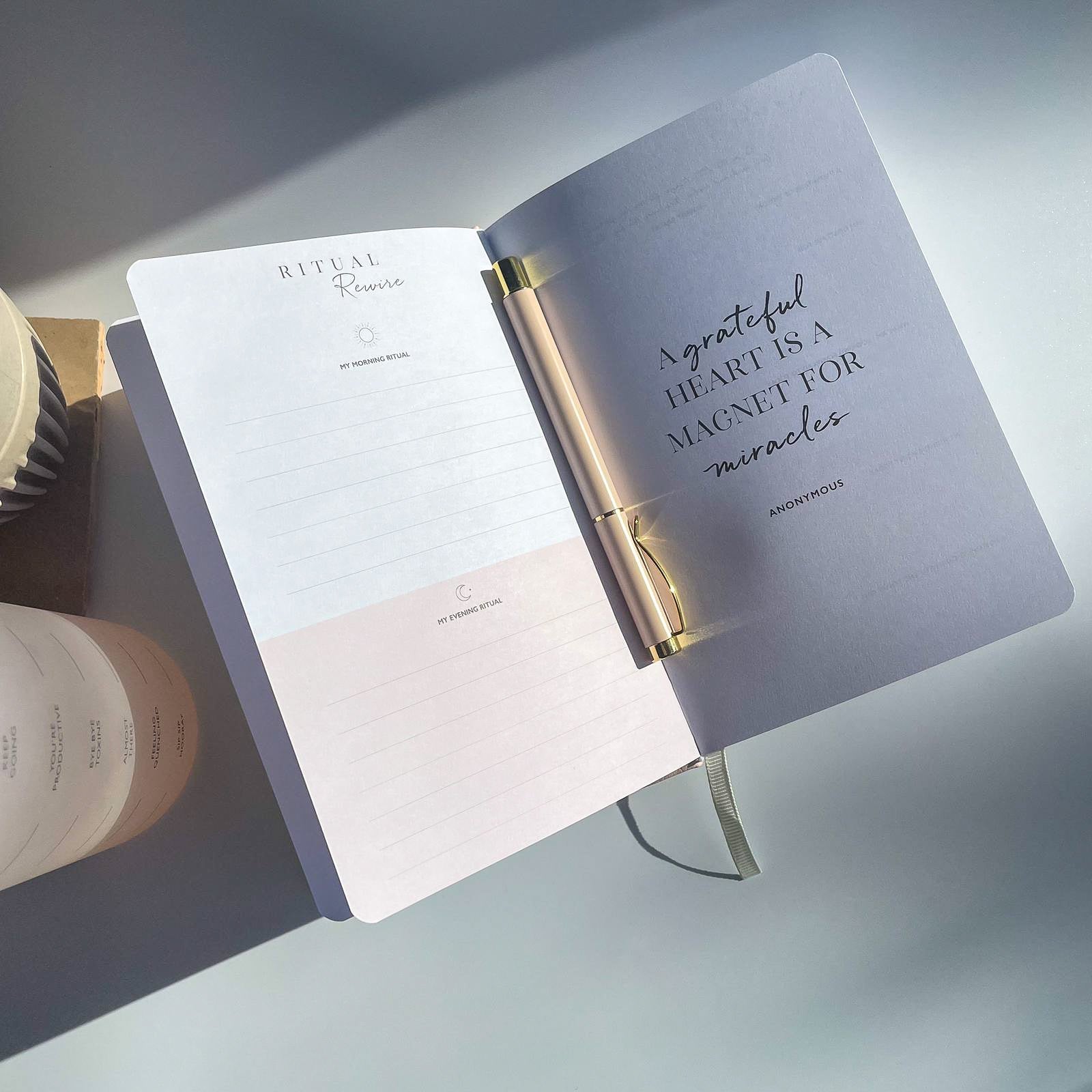
Want A Daily Gratitude Practice To Transform Your Entire Day – And Life?
Gratitude. What is gratitude? You might say it’s the art of being thankful for what you have, appreciating the small things in life, or expressing thanks to someone who has done you a kindness. Us? We reckon it’s best summed up in the words of positive psychology researcher Sonja Lyubomirsky.
She says, “Gratitude is an antidote to negative emotions, a neutralizer of envy, hostility, worry, and irritation. It is savouring; it is not taking things for granted; it is present-oriented.”
See, when you’re grateful, and we mean truly, deep-down-in-your-soul grateful, all the negative stuff that brings you down can’t reach you. Anger, sadness, self-doubt: none of it can exist in the face of gratitude. It is one of the highest vibrations there is and when you focus on it, all that other stuff dissolves and reduces.
Not only that but this magical feeling of joy can attract even more wonderful blessings into your life. Oprah keeps a gratitude journal and says, “Be thankful for what you have, and you’ll end up having more.” Put simply, being grateful makes your blessings multiply.
The good news? You can practice gratitude anywhere and everywhere and literally everyone can do it – yep, that includes you. Whether you want to feel happier, be more present, reduce stress, or simply find more beauty in life, gratitude is the answer. But don’t just take our word for it…
The Science Of Gratitude
Gratitude isn’t just a spiritual concept, it’s actually a bonafide area of scientific study. Researchers have been studying it since the early 2000s and as it turns out there’s a whole host of proven neuroscientific benefits to it.
So, here’s your primer: What happens when you practice gratitude? When we feel grateful our brains release a surge of dopamine, a hormone that makes us feel really good and provides a natural high. At the same time, it also produces serotonin, a hormone that balances our mood and aids feelings of relaxation.
When we express gratitude, activity in the brain’s prefrontal cortex also ramps up which helps us make better decisions and improves our learning (hence why gratitude is an excellent starting point on your self-improvement journey.)
What’s more, gratitude also stimulates our brain’s altruism and reward systems which motivates us to be charitable and kind to others, as well as seeking rewards for ourselves. Armed with gratitude you’re simply more likely to go after your goals.
As if that wasn’t enough, gratitude also has a wealth of proven health benefits, including immune support, decreased stress levels, improved sleep quality, and better emotional awareness.
How To Cultivate Gratitude
Maybe you’re no novice and you’re already practising gratitude and using a gratitude journal on the daily, but simply need a little guidance on how to amplify its effects and feel it more deeply. Or perhaps you’re a complete beginner and the process of being grateful for everything in your life is a new and novel concept.
Whichever camp you fall into, we’re here to help. Here at The Head Plan, we know a thing or two about gratitude. We use it on the good days and the bad and we’ve created a game-changing gratitude journal that allows you to make gratitude a daily habit in as little as five minutes. If you have ever wondered...how does a gratitude journal work? We included detailed explainer pages so you know what to put into your gratitude journal, and gratitude journal prompts to keep you on track each morning and evening.
So are you ready to make gratitude not just a fleeting feeling but a way of life? Here’s how…
Create a gratitude ritual
How do I do that, you ask. Use The Head Plan journal, of course. It’s a surefire way to ensure you practice gratitude on the daily with space to record the three things you’re most grateful for each and every day. Make the process as pleasant as possible; you could use your favourite pen, light a dreamy scented candle, and curl up in the cosiest spot in your home. The more you can look forward to and savour this magical practice, the more you’ll want to do it again and again.
To stay consistent, you might like to set a specific time aside that you practice gratitude every single day. Our advice? Do it in the morning when you first wake up. It’ll set the tone for the day head.
Here’s the good news: The more you do it, the easier it’ll become. Seriously. Every time you practice gratitude daily you are strengthening your brain’s neural circuits, making it easier to maintain and focus on that feeling of gratitude in the future. How’s that for a return on investment?

Appreciate the little things
… and we mean the really little things. When was the last time that you gave thanks for the plates you eat your breakfast, lunch and dinner of? Or felt deeply grateful for the water supply in your home that allows you to take an invigorating hot shower each and every morning?
Day to day it can be easy to take these things for granted; it’s easy to get caught up in our troubles and forget just how much we have to be grateful for. But when you hone in on the tiny little things that make our lives more manageable and enjoyable you can establish a deep, deep appreciation for all that you have. It allows you to create a feeling of ‘fullness’ rather than lack.
Here’s our advice: every morning after you’ve filled out your Gratitude Journal, say thank you for every single thing you touch and use while you’re getting ready, from your toothbrush and toothpaste to the bowl you make your breakfast in. Trust us, by the time you’re finished, you’ll be simply buzzing to start the day.
Use it in negative situations
We know what you’re thinking: How could you ever feel grateful for the situations in your life that cause you pain and strife?
Listen carefully. We get it: we know it can be easy to feel grateful when things are going great, and challenging when everything seems to be going wrong. But this is where gratitude can really work its magic: it can provide perspective, restore a feeling of calm, and even help you problem solve.
This unattributed quote sums it up: “The most powerful weapon against your daily battles is finding the courage to be grateful anyway.”
One of the quickest ways you can do just that is to ask ‘what is this teaching me?’ and then jot down your answers. Next, write a list of five blessings associated with the challenge and say ‘thank you’ for them. Maybe it’s taught you resilience, given you an opportunity to open up to a friend, or helped you get clearer on what you really want.
Search for and appreciate the hidden positives. They are there. We promise.
End your day with gratitude
In The Magic, author Rhonda Byrne recommends making a mental recap of your day right before you fall asleep and pinpointing the very best thing that happened so you can feel gratitude for it.
When you mentally flick back through your day, you’ll realise that it was made up of many magical moments, even if on the face of it, the past 24 hours didn’t seem all that special. It might be that first sip of tea in the morning, the laughs you exchanged with a friend or that exciting work email that landed in your inbox. When you look back, you’ll realise that there were many little blessings that came your way.
It all starts with gratitude…
You know that saying “The grass isn’t greener on the other side, it’s greenest where you water it?” Think of gratitude as the water. If you want your life to be lush and green, you need to shower it in gratitude.
Put simply, gratitude turns what we have into enough, while simultaneously attracting more for us to love and appreciate. It doesn’t matter where you’re at, who you are, or how terrible things seem, what you put into a gratitude journal can turn your whole day - and life - around.
So, let us ask you this: what are you grateful for?

